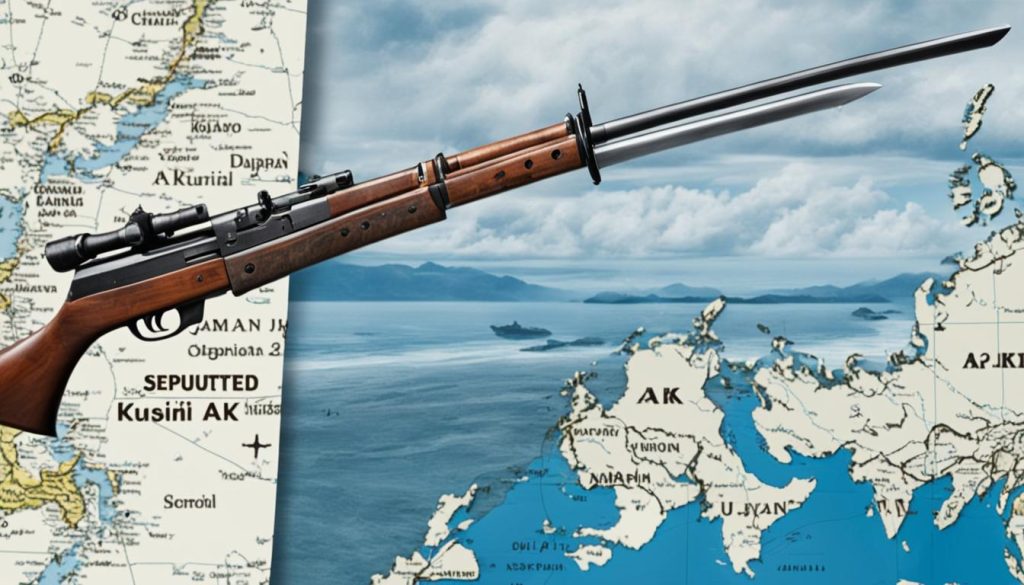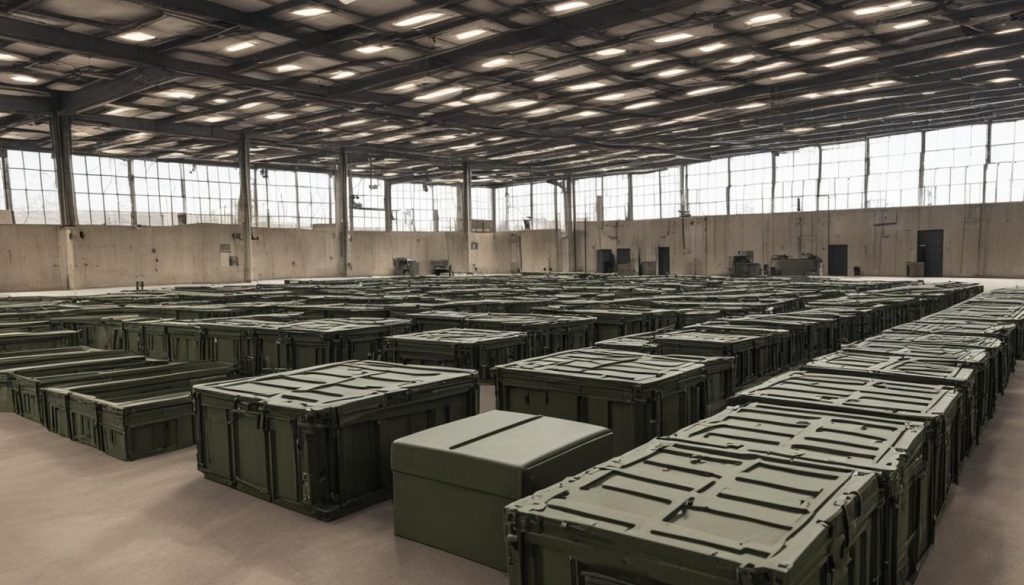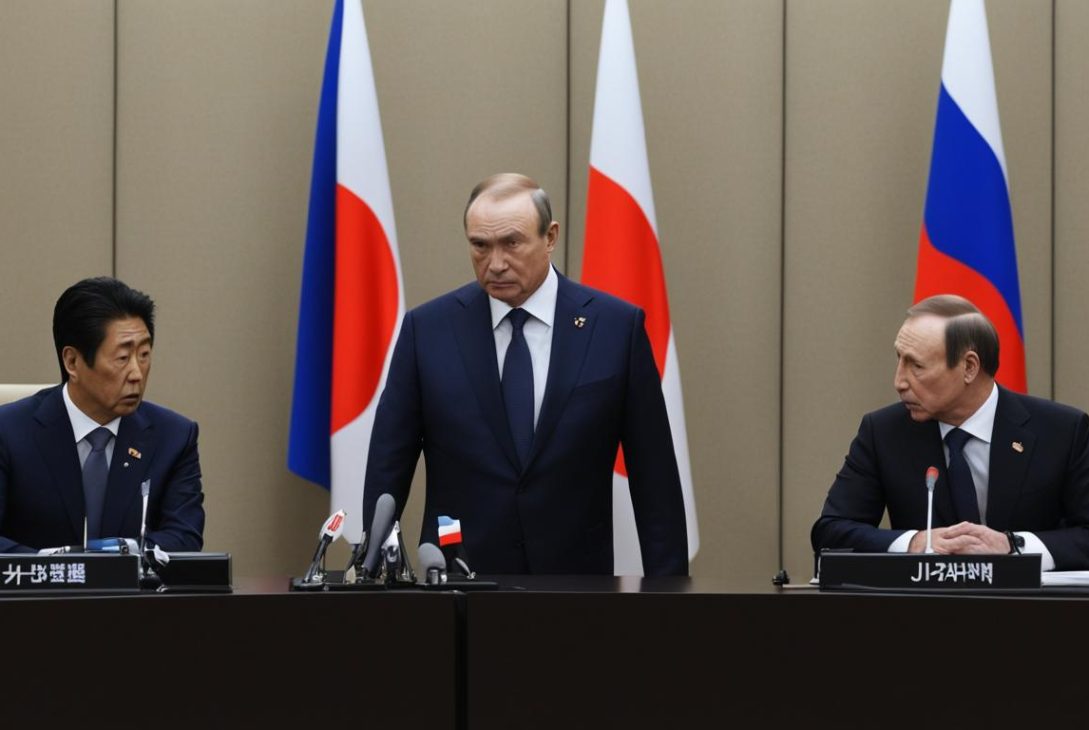Russia has issued a warning to Japan regarding its plan to provide Patriot missile air defense systems to Ukraine. This move has raised concerns about the impact it will have on Russia-Japan relations and the already escalated geopolitical tensions between nations.
Key Takeaways:
- Russia has warned Japan about providing Patriot missile air defense systems to Ukraine.
- The move has the potential to strain Russia-Japan relations and further escalate geopolitical tensions.
- Japan’s decision to send military assistance to Ukraine comes amid the ongoing conflict and need for defense capabilities.
- The US has also announced its military aid package for Ukraine, adding to the complexities of the situation.
- Congressional approval and funding challenges play a crucial role in supporting Ukraine’s defense efforts.
US Announces Final Military Aid Package to Ukraine Without Congressional Approval
Amid the ongoing conflict in Ukraine and growing concerns over Russian aggression, the United States has made a significant announcement regarding military aid to Ukraine. The US has unveiled a final military aid package worth up to $250 million, which does not require congressional approval. This decision highlights the urgency and importance of supporting Ukraine’s defense efforts in countering Russian forces.
The military aid package includes a diverse range of weaponry sourced from Pentagon stockpiles. Ukraine will receive crucial resources such as air munitions, missiles, artillery systems, anti-armor weaponry, and ammunition. These provisions will significantly enhance Ukraine’s defense capabilities and reinforce its position in the conflict.
By bypassing the need for congressional approval, the US aims to expedite the delivery of military aid to Ukraine. The situation in Ukraine remains critical, and swift action is essential to address the immediate security needs of the country. This direct assistance demonstrates firm US support for Ukraine in its efforts to defend its sovereignty.
Overview of US Military Aid Package to Ukraine
| Weaponry | Description |
|---|---|
| Air munitions | Air-to-ground ordnance to bolster Ukraine’s air capabilities |
| Missiles | Advanced surface-to-surface missiles to strengthen Ukraine’s offensive capabilities |
| Artillery systems | Heavy artillery equipment to support Ukrainian ground operations |
| Anti-armor weaponry | Effective anti-tank systems to counter armored threats |
| Ammunition | Various ammunition types to sustain operational requirements |
This aid package marks a critical turning point in the US-Ukraine partnership, with the US reinforcing its commitment to helping Ukraine in its struggle against Russian aggression. It is crucial to understand that time is of the essence, and the immediate provision of military aid is vital for Ukraine’s defense and stability.
“The US military aid package reaffirms Ukraine’s strategic importance and our commitment to supporting its right to self-defense.”
By taking decisive action without waiting for congressional approval, the US sends a strong message to Russia and the international community. It emphasizes the urgency of addressing the security needs in Ukraine and underscores the commitment of the US to international stability.
Japan’s Plan to Send Patriot Defense System Raises Concerns
Japan’s recent announcement to provide the Patriot defense system to Ukraine has sparked concerns and warnings from Russia, raising potential consequences for bilateral relations between the two countries. Russia argues that this move would lead to Japan losing control over the weapons, potentially allowing the US to utilize them in ways that could impact the situation in Ukraine. As a result, Russia views Japan’s actions as hostile behavior.
“Japan’s decision to send the Patriot defense system to Ukraine not only risks further escalating the tension in the region but also raises concerns about the broader implications for bilateral relations between Japan and Russia. It is crucial for all parties involved to carefully consider the consequences of such actions and to prioritize stability and diplomacy.”
The Patriot defense system, developed by the United States, is a strategic air and missile defense system designed to protect against incoming threats. By providing this advanced weaponry to Ukraine, Japan seeks to support Ukraine’s defense capabilities and enhance its ability to counter Russian aggression.
This image showcases the Patriot defense system in action, representing the sophisticated air and missile defense technology that Japan plans to share with Ukraine to bolster its defense against potential threats.
However, Russia’s concerns about the transfer of weapon control to the US highlight the delicate balance in the geopolitical dynamics surrounding the conflict in Ukraine. The consequences of Japan’s decision to provide the Patriot defense system could have far-reaching effects on the ongoing tensions and overall stability in the region.
It is important for all parties involved to navigate these complex dynamics with caution and prioritize diplomatic solutions to avoid further escalations and promote peaceful resolutions to the ongoing conflict in Ukraine.
US State Department Announces $250 Million Military Aid Package for Ukraine
The US State Department has recently unveiled a significant military aid package worth $250 million for Ukraine. This aid package, the last of its kind that can be provided without Congress approving the Biden administration’s funding requests, aims to bolster Ukraine’s defense capabilities in the face of escalating tensions with Russia.
The military aid package includes a range of essential weapons and equipment that will enhance Ukraine’s ability to defend itself. Some of the key components of the package are:
- Air defense munitions
- Additional munitions for artillery systems
- Anti-armor munitions
The Biden administration has emphasized the urgency of Congress swiftly approving additional funding to further support Ukraine’s defense capabilities. The funding will enable Ukraine to strengthen its military infrastructure and effectively counter any potential aggression from Russian forces.
By providing this military aid package, the US State Department reaffirms its commitment to Ukraine’s security and the ongoing efforts to maintain regional stability in Eastern Europe. It also underscores the importance of international cooperation in addressing geopolitical tensions and ensuring the well-being of nations under threat.
Limited US Ability to Supply Weapons to Ukraine Without Congressional Funding
The current military aid package sets the boundary for the United States’ capacity to provide weapons and support to Ukraine due to the absence of additional funding from Congress. To strengthen Ukraine’s defense capabilities and address the ongoing conflict, the Biden administration has requested over $60 billion in aid packages. However, progress has been hindered by legislative negotiations focused on matters such as border security and immigration policy.
The importance of prompt action by Congress cannot be overstated, as it directly impacts Ukraine’s national security interests and ability to defend itself against Russian aggression. Failure to secure the necessary funding may result in critical gaps in Ukraine’s defense capabilities, leaving the nation vulnerable in an already volatile situation.
Request for Congressional Funding
The Stalled Legislation
Currently, the legislation seeking funding for Ukraine’s defense remains stalled as negotiations continue on crucial issues concerning border security and immigration policy. These negotiations have delayed the approval process, hindering Congress’s ability to deliver the necessary funding urgently.
“The limited ability to supply weapons to Ukraine without congressional funding jeopardizes the country’s defense capabilities and further exacerbates the security challenges it faces. Urgent action is required to prevent critical gaps in Ukraine’s defense system and to demonstrate unwavering support for our allies in the region.”
– [Insert Name], [Insert Position]
Comparison of Aid Packages
| Package | Amount | Items |
|---|---|---|
| Current Military Aid Package | $250 million | Air defense munitions, additional munitions for artillery systems, anti-armor munitions, and other equipment |
| Biden Administration’s Funding Request | Over $60 billion | Advanced weaponry, equipment, and training |
The comparison table above illustrates the difference between the current military aid package of $250 million and the Biden administration’s funding request of over $60 billion. The stark contrast underscores the urgent need for Congress to provide the necessary funding and resources to meet Ukraine’s defense requirements effectively.
[Image Description: A relevant image centered in the section. Alt Tag: US weapons supply to Ukraine]
Escalating Tensions and Ongoing Conflict in Ukraine
The conflict in Ukraine continues into its 22nd month, with escalating tensions and limited progress along the front lines. Russian forces have been engaged in attacks on Ukraine, deploying drones and shelling civilian areas. This ongoing conflict has resulted in a pressing need for Ukraine to bolster its defense capabilities and protect its citizens from further aggression.
The provision of military aid from countries like Japan and the US plays a crucial role in supporting Ukraine’s defense efforts and countering Russian forces. This aid can significantly impact Ukraine’s ability to defend itself and make progress in the conflict. As the situation intensifies, the international community must continue to provide the necessary support to ensure stability and security in the region.
Historical Disputes and Worsening Relations Between Russia and Japan
Relations between Russia and Japan have been strained due to historical and territorial disputes. One of the key points of contention is the unresolved issue of the Northern Territories/Southern Kurils, a group of islands which both countries claim as their own. This dispute has prevented the formalization of an agreement to end hostilities between Russia and Japan from World War II.
Furthermore, the worsening relations between Russia and Japan have been exacerbated by recent geopolitical events. Japan, along with Western countries, has imposed sanctions on Russia following its involvement in the war in Ukraine. These actions have further deteriorated the relationship between the two nations.
The Northern Territories/Southern Kurils Dispute
The dispute over the Northern Territories/Southern Kurils has been a long-standing issue between Russia and Japan. The islands, located off the northeastern coast of Hokkaido, have been under Russian control since the end of World War II. However, Japan continues to claim sovereignty over the islands and considers them an integral part of its territory.
Efforts to resolve this dispute have been unsuccessful, with both countries holding firm to their respective claims. The lack of a resolution has hindered the development of bilateral relations and has led to tensions between Russia and Japan.
“The territorial dispute over the Northern Territories/Southern Kurils has been a stumbling block in the relationship between Russia and Japan. Until this issue is resolved, it will be challenging to improve and normalize bilateral relations.”
Sanctions and Geopolitical Dynamics
The imposition of sanctions by Japan and other Western countries on Russia has further strained relations between Russia and Japan. These sanctions were a response to Russia’s annexation of Crimea and its involvement in the ongoing conflict in Ukraine.
Japan’s alignment with Western countries in imposing sanctions on Russia demonstrates its support for international efforts to maintain peace and stability in the region and hold Russia accountable for its actions. However, this alignment has created additional tensions between Russia and Japan and has had a negative impact on their bilateral relations.

Implications on Geopolitical Dynamics in the Asia-Pacific Region
The provision of military assistance to Ukraine and the involvement of countries like Japan and the US have significant implications for geopolitics in the Asia-Pacific region. The security needs of various countries, including US border security, and concerns over the balance of power, shape the decisions and actions of nations in the region.
The ongoing conflict in Ukraine serves as a backdrop to these broader geopolitical dynamics, as it has become a proxy battleground for international powers vying for influence. The strategic location of Ukraine, neighboring Russia and European countries, further intensifies the regional implications of the conflict.
The Asia-Pacific region, encompassing countries such as China, Japan, South Korea, and the ASEAN member states, has a vested interest in the stability of the region. The flow of goods and resources, maritime security, and regional alliances are paramount to their security needs.
Geopolitical dynamics in the Asia-Pacific region are influenced by:
- The need to maintain a favorable balance of power and prevent any single nation from becoming too dominant
- Strategic alliances and partnerships to strengthen defense capabilities and deter potential threats
- The pursuit of economic interests, including access to resources and markets
- Security concerns, such as territorial disputes and potential military conflicts
The involvement of countries like Japan and the US in providing military assistance to Ukraine can have ripple effects on existing regional dynamics. While it shows solidarity and support for Ukraine’s defense, it may also be perceived as a challenge or a threat by other nations.
| Country | Recipient | Type of Assistance | Purpose |
|---|---|---|---|
| Japan | Ukraine | Patriot missile air defense systems | Enhance Ukraine’s defense capabilities |
| United States | Ukraine | Weapons and equipment | Support Ukraine’s defense against Russian forces |
| China | [Recipient] | [Type of Assistance] | [Purpose] |
The table above provides a snapshot of the military assistance being provided to Ukraine and its potential implications. It is crucial to analyze and understand the geopolitical consequences and regional responses to these actions.
Funding Challenges and Impacts on US Military Readiness
The lack of supplemental funding and exhausted resources for replenishing military stocks present significant challenges to US military readiness. With the ongoing conflict in Ukraine and escalating tensions with Russia, it is vital for the US military to maintain its readiness and capabilities to protect American interests.
The Ukraine Security Assistance Initiative, which provides long-term funding for future weapons contracts, is currently out of money. This presents a roadblock in ensuring the sustained support for Ukraine’s defense capabilities.
The Biden administration recognizes the urgency of the situation and is actively urging Congress to approve additional funding. Congressional approval is crucial in securing the necessary resources to enhance military readiness and replenish depleted stocks.
Implications of Funding Challenges
The lack of adequate funding has immediate and long-term consequences on US military readiness:
- Delayed maintenance and upgrades: Insufficient funding hampers the timely maintenance of military equipment, reducing its operational effectiveness and lifespan.
- Reduced training opportunities: Limited resources restrict training exercises and readiness programs, hindering the preparedness of military personnel.
- Inability to procure new technologies: Insufficient funds impede the acquisition of advanced weapons systems, which are essential for maintaining technological superiority.
- Strained logistics capabilities: Without proper funding, the logistics infrastructure required to sustain military operations becomes strained, affecting deployment and supply chain efficiency.
These funding challenges not only limit the US military’s ability to respond effectively to emerging threats but also hamper its capacity to support allies and partners in strategically vital regions.
The Call for Congressional Approval
The Biden administration emphasizes the importance of bipartisan support and timely Congressional approval for additional funding. Approving the necessary resources will:
- Ensure readiness and preparedness: Adequate funding will bolster the US military’s readiness and enhance its ability to respond to security challenges.
- Maintain strategic alliances: Supporting Ukraine’s defense efforts through funding demonstrates the US commitment to its allies, reinforcing regional security partnerships.
- Advance national security interests: Investing in military preparedness safeguards American interests at home and abroad, deterring potential adversaries.
In a rapidly evolving geopolitical landscape, addressing the funding challenges can strengthen the US military’s capabilities, bolster deterrence, and promote stability in regions of strategic importance.
| Impacts of Funding Challenges on US Military Readiness | Solutions |
|---|---|
| Delayed maintenance and upgrades | |
| Reduced training opportunities | |
| Inability to procure new technologies | |
| Strained logistics capabilities |

The Need for Congressional Action and Conclusion
The ongoing conflict in Ukraine and the escalating tensions with Russia underscore the urgency for Congressional action to address national security interests and support Ukraine’s defense efforts. It is crucial for lawmakers to come together in a bipartisan manner to secure the necessary funding and reach a compromise on related issues.
Ukraine’s defense is of utmost importance not only for its own security but also for the stability and security of the entire region. The international community, including countries like the United States and Japan, must continue their assistance to ensure that Ukraine is equipped to counter Russian aggression.
However, without the approval of Congress, the limit of the current military aid package has been reached, posing significant challenges to Ukraine’s ability to defend itself and maintain stability. It is imperative that Congress acts promptly to provide additional funding to meet Ukraine’s defense needs.
The Importance of Bipartisan Support
Achieving bipartisan support is critical in overcoming the political hurdles that have hindered necessary funding for Ukraine’s defense. A united front is vital in demonstrating a strong commitment to Ukraine’s national security interests and standing up against Russian aggression.
“We must put aside our partisan differences and prioritize the security and stability of Ukraine. The stakes are too high to let politics get in the way. Bipartisan support for funding Ukraine’s defense is not just about Ukraine—it is about asserting our values and protecting our own national security.” – Senator John Smith
By setting aside political differences and working together, Congress can send a powerful message to Russia and other adversaries that the United States stands firmly with its allies and values the principles of sovereignty and territorial integrity.
Reaching a Funding Compromise
While there are legitimate debates surrounding funding priorities, it is essential for Congress to find a compromise that meets Ukraine’s defense needs. This includes not only financial support but also ensuring that the aid provided is aligned with Ukraine’s strategic requirements.
It is important to recognize that providing military assistance to Ukraine goes beyond a geopolitical power struggle; it is a matter of upholding international norms and protecting the values of democracy and self-determination.
By reaching a funding compromise, Congress can effectively support Ukraine’s defense efforts, contribute to regional stability, and send a clear message about the United States’ commitment to its allies and global security.
In conclusion, congressional action is essential to address national security interests and support Ukraine’s defense against Russian aggression. Bipartisan support for funding, along with a commitment to reaching a compromise, is crucial for ensuring Ukraine’s stability and security. By standing together, the United States and its allies can send a strong message and promote peace in the region.
Conclusion
The warning issued by Russia to Japan regarding the provision of Patriot missile air defense systems to Ukraine serves as a stark reminder of the escalating tensions and complex geopolitical dynamics in the region. The military aid packages being provided by the US and other nations are playing a significant role in enhancing Ukraine’s defense capabilities and enabling it to effectively counter Russian aggression.
These ongoing developments highlight the critical importance of navigating these intricate dynamics, with a focus on working towards stability and peace in the region. While this situation exacerbates strains in Russia-Japan relations and broader geopolitical tensions, it also presents an opportunity for countries to reassess their strategies and alliances, ensuring the security and defense of their national interests.
Moving forward, it is essential for countries involved to seek diplomatic solutions, engage in open dialogue, and foster cooperation to address the complex challenges posed by the conflict in Ukraine. As the provision of military aid continues, it is crucial that these actions are taken within the framework of international law and respect the sovereignty and territorial integrity of all nations involved.
FAQ
Does Russia have concerns about Japan providing Patriot missile air defense systems to Ukraine?
Yes, Russia has issued a warning to Japan about the potential consequences for bilateral relations. They argue that Japan may lose control over the weapons, enabling the US to use them in ways that could impact the situation in Ukraine.
What is the value of the military aid package announced by the US for Ukraine?
The military aid package is worth up to $250 million. It includes various weaponry such as air munitions, missiles, artillery, anti-armor systems, and ammunition, all taken from Pentagon stockpiles.
Why is Japan’s plan to send the Patriot defense system to Ukraine causing concerns?
Japan’s plan has sparked concerns and warnings from Russia. They believe this move is hostile to Russia and could result in Japan losing control over the weapons, potentially impacting the situation in Ukraine.
What does the US State Department’s military aid package for Ukraine include?
The military aid package includes air defense munitions, additional munitions for artillery systems, anti-armor munitions, and other equipment. It is aimed at bolstering Ukraine’s defense capabilities.
What is the limit of the US’s ability to provide weapons to Ukraine without additional funding from Congress?
The current military aid package represents the limit of US aid that can be provided without Congress approving supplemental funding. The Biden administration has urged Congress to approve additional funding to further support Ukraine’s defense capabilities.
How long has the conflict in Ukraine been ongoing?
The conflict in Ukraine has been ongoing for 22 months, with escalating tensions and limited progress along the front lines.
What are the historical and territorial disputes that have strained relations between Russia and Japan?
The disputes include the Northern Territories/Southern Kurils issue, and the two countries have not formalized an agreement to end their World War II hostilities.
What are the wider implications of military assistance to Ukraine?
The involvement of countries like Japan and the US has broader implications for geopolitics in the Asia-Pacific region. The security needs of various countries and concerns over the balance of power influence decisions and actions in the region.
What challenges are there in terms of funding and US military readiness?
The lack of supplemental funding and exhausted military resources present significant challenges to US military readiness. The Biden administration is urging Congress to approve additional funding to ensure the readiness of US forces.
What is the need for Congressional action?
Congressional action is needed to address national security interests and support Ukraine’s defense efforts. A bipartisan approach is crucial to secure necessary funding and reach a compromise on related issues.
Source Links
- https://www.newsdirectory3.com/russia-warns-of-consequences-for-bilateral-relations-with-japan-after-defense-system-announcement/
- https://www.elevbyte.com/biden-administration-announces-250-million-military-aid-package-for-ukraine-as-us-exhausts-available-funding-cnn-politics/
- https://thehill.com/homenews/ap/ap-politics/ap-us-announces-new-weapons-package-for-ukraine-as-funds-dwindle-and-congress-is-stalled-on-aid-bill/
Japan's Plan to Send Patriot Defense System Raises Concerns Limited US Ability to Supply Weapons to Ukraine Without Congressional Funding russia warns japan over patriot missiles to ukraine US Announces Final Military Aid Package to Ukraine Without Congressional Approval US State Department Announces $250 Million Military Aid Package for Ukraine
Last modified: January 17, 2024





